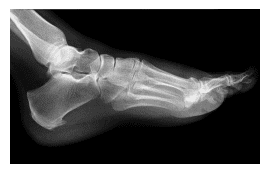Pain Upon Rising
Pain Upon Rising
 A very common description of foot pain from our patients at ETFA is the complaint that “my feet hurt when I get out of bed in the morning”. Now this can be caused by many things, but I would like to explain the phenomenon of post-static dyskinesia that my patients often experience. The spaces for swelling in the deeper tissues of the foot are very tight. Very small amounts of swelling can often lead to discomfort in some areas. When the foot is in motion, particularly when weight bearing, the muscles and motion of the foot squeeze any swelling in these places away and the swelling will move up into the lower leg. This “natural pump” is very efficient as long as it keeps running.
A very common description of foot pain from our patients at ETFA is the complaint that “my feet hurt when I get out of bed in the morning”. Now this can be caused by many things, but I would like to explain the phenomenon of post-static dyskinesia that my patients often experience. The spaces for swelling in the deeper tissues of the foot are very tight. Very small amounts of swelling can often lead to discomfort in some areas. When the foot is in motion, particularly when weight bearing, the muscles and motion of the foot squeeze any swelling in these places away and the swelling will move up into the lower leg. This “natural pump” is very efficient as long as it keeps running.
When we get off of our feet for an extended time, such as driving home from work, sitting to rest or sleeping at night the “pump” is turned off and the swelling collects. When we engage this “pump” by getting up on our feet and walking there is a build up swelling that must be moved quickly and it is painful until a few steps are taken and we begin to get the swelling moving. So often, patients think it is the first few steps that are the problem but actually it is the activity before resting that led to the swelling build up.
Most likely, the foot is not being properly supported while walking or working and this leads to continual swelling throughout the day. If you are suffering with pain upon rising, you might try icing your feet at the end of your day. Rolling a frozen water bottle on the floor underneath your foot from your heel to the ball of your foot can be very helpful. As podiatrists we can assess the foot for lack of support and swelling and often can relieve this pain upon rising with simple shoe, insole or lifestyle modifications.
PLEASE NOTE:
The information contained in this article is not intended to provide advice for individual problems, nor to substitute for professional advice or care from a physician. For answers to specific questions concerning your personal circumstances, you should consult your physician directly.
